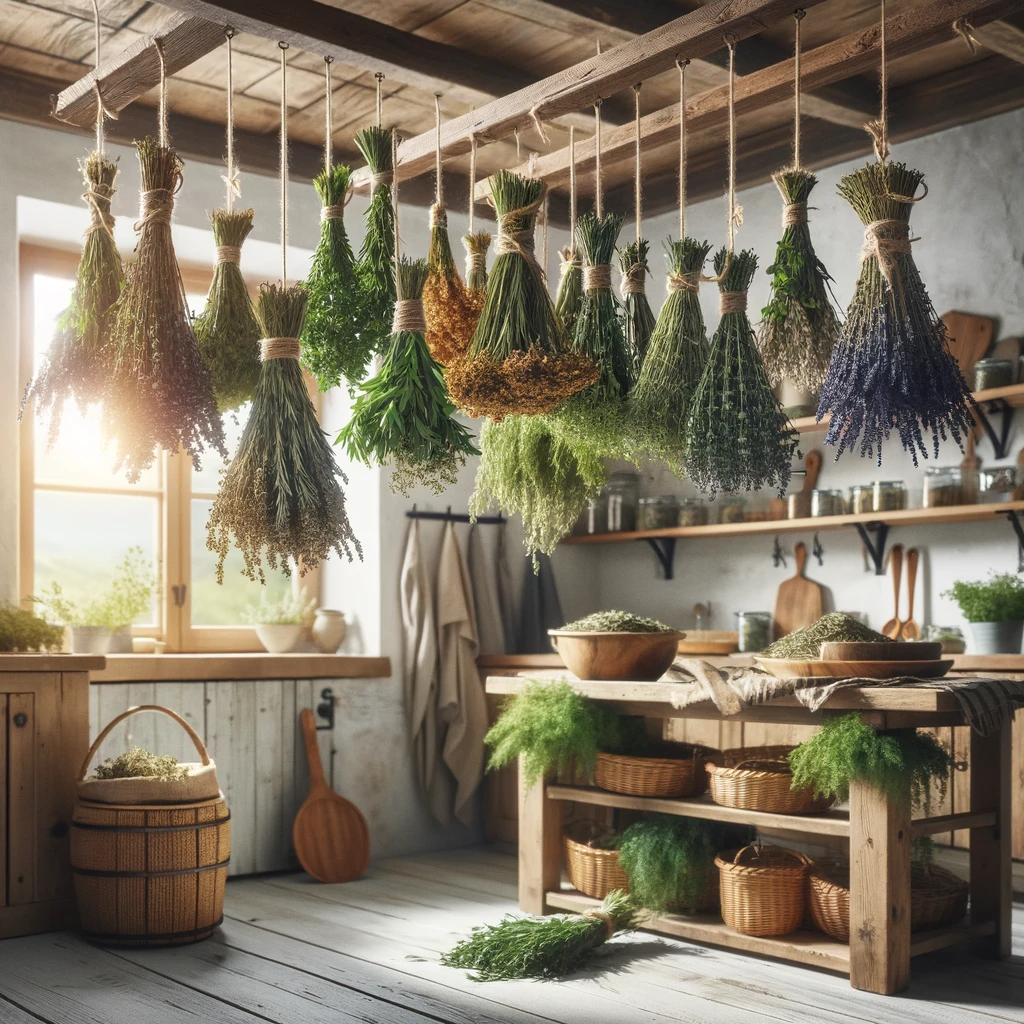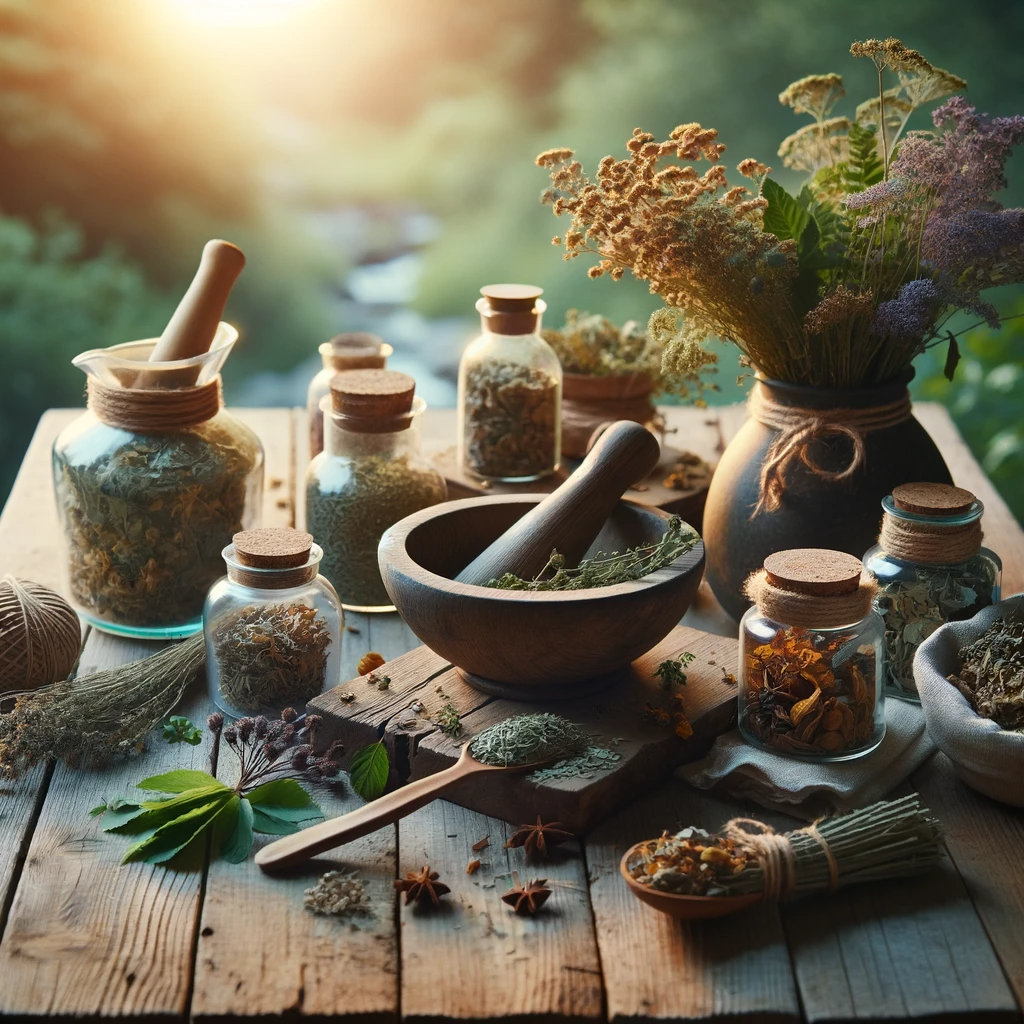Harnessing Nature’s Healing: How to Dry and Store Herbs for Medicinal Use

Key Takeaways Table
| Key Point | Details |
|---|---|
| Choosing the Right Herbs | Importance of selecting suitable herbs for drying and medicinal use. |
| Drying Techniques | Overview of effective drying methods for preserving herbs. |
| Storage Solutions | Best practices for storing dried herbs to retain their potency. |
| Utilizing Dried Herbs | Tips on how to use dried herbs for medicinal purposes. |
| Integrating Herbs into Holistic Health | Linking dried herbs to holistic health practices. |
Herbs have been a cornerstone of medicinal practices for centuries, offering a natural way to support health and wellness. The process of drying and storing herbs is a vital skill for anyone interested in harnessing the therapeutic benefits of these plants. In this comprehensive guide, we will explore the art of preparing herbs for medicinal use, ensuring their potency and effectiveness are retained.
Choosing the Right Herbs
Before diving into the drying process, it’s crucial to select the appropriate herbs. Not all herbs are created equal, especially when it comes to medicinal use. Some herbs are more potent and beneficial in their dried form. A great starting point for beginners is our guide on the best herbs for beginners, which provides insights into the most effective and easy-to-use herbs for those new to this practice.
Drying Techniques
Drying herbs is more than just a preservation method; it’s an art that enhances their medicinal qualities. There are several methods to dry herbs, each with its own benefits:
- Air Drying: This traditional method involves hanging herbs in bunches in a warm, dry, and well-ventilated area away from direct sunlight.
- Oven Drying: For quicker results, herbs can be dried in an oven at a low temperature. This method requires careful monitoring to prevent burning.
- Dehydrator Drying: Using a dehydrator is an efficient way to uniformly dry herbs, especially in humid climates.

Storage Solutions
Once dried, herbs must be stored correctly to maintain their medicinal properties. Here are key storage tips:
- Use airtight containers to protect from moisture and light.
- Label containers with the herb name and date of storage.
- Store in a cool, dark place to prolong their potency.
Utilizing Dried Herbs
Dried herbs can be used in various ways for medicinal purposes. They can be brewed into teas, infused into oils, or even ground into powders for capsules. The potency of herbs can vary, so it’s essential to understand the appropriate dosages and applications.
Integrating Herbs into Holistic Health
Herbs play a significant role in holistic health approaches. They can complement other holistic practices, such as nutrition and therapy. For more insights into integrating herbs into a holistic lifestyle, explore our resources on holistic health, holistic nutrition and health, and holistic therapy and wellness.
The Impact of Environment on Herb Drying
The environment plays a crucial role in the drying process of herbs. Factors such as humidity, temperature, and air quality can significantly affect the drying time and quality of the herbs. Here’s what to consider:
- Humidity Levels: High humidity can prolong the drying process and may lead to mold growth. It’s essential to choose a dry environment or use dehumidifiers.
- Temperature Control: While warmth aids in drying, excessive heat can destroy the delicate oils and flavors of the herbs.
- Air Quality: Clean, unpolluted air is preferable to maintain the purity and medicinal properties of the herbs.
Holistic Health Benefits of Dried Herbs
Dried herbs not only serve as remedies but also contribute to overall wellness. Here’s how they integrate into a holistic health regimen:
- Stress Reduction: Herbs like lavender and chamomile are known for their calming effects.
- Immune Support: Echinacea and elderberry are popular for boosting immune health.
- Digestive Health: Peppermint and ginger aid in digestion and soothe stomach issues.

Creative Uses of Dried Herbs
Apart from medicinal teas and infusions, dried herbs can be creatively incorporated into daily life. Here are some innovative ideas:
- Herbal Sachets: Fill small bags with dried lavender or chamomile for a soothing aroma in drawers or closets.
- Cooking and Baking: Incorporate dried herbs into recipes for added flavor and health benefits.
- Homemade Skincare: Use dried herbs to make natural skincare products like herbal baths or facial steams.
Community and Learning Resources
Engaging with a community of herbal enthusiasts can enhance your learning experience. Consider joining online forums or local workshops to share tips, recipes, and experiences with others passionate about herbal medicine.
Sustainability in Herb Cultivation and Drying
Sustainable practices are vital in herb cultivation and drying. By adopting eco-friendly methods, we not only ensure the longevity of our herbal resources but also contribute to environmental conservation. Here are some sustainable practices to consider:
- Organic Cultivation: Growing herbs without synthetic pesticides or fertilizers.
- Water Conservation: Using drip irrigation or rainwater harvesting for watering herbs.
- Energy-efficient Drying Methods: Utilizing solar dryers or air drying as opposed to electric dehydrators.
Future Trends in Herbal Medicine
The field of herbal medicine is constantly evolving. With the growing interest in natural health remedies, we can anticipate:
- Advanced Research: More scientific studies validating the efficacy of herbs.
- Integration with Modern Medicine: A greater synergy between herbal and conventional medical practices.
- Digital Tools: Use of apps and online platforms for herb identification, preparation, and usage.
The Ethical Considerations of Herbal Medicine
As the popularity of herbal medicine grows, it’s crucial to address ethical considerations. Responsible sourcing, respecting traditional knowledge, and ensuring equitable access to herbal remedies are key to maintaining the integrity of herbal practices. Here’s how:
- Responsible Sourcing: Prioritizing the use of ethically sourced and sustainably harvested herbs.
- Respecting Traditional Knowledge: Acknowledging and respecting the cultural roots and knowledge systems that have nurtured herbal medicine for generations.
- Equitable Access: Working towards making herbal remedies accessible to diverse communities, breaking down barriers related to cost and availability.

Balancing Tradition and Innovation
The field of herbal medicine is a blend of ancient wisdom and modern innovation. Balancing these elements is essential for its evolution:
- Honoring Ancient Practices: Upholding the traditional methods of herb preparation and use, ensuring they are not lost over time.
- Embracing Modern Techniques: Leveraging technology and scientific research to enhance the efficacy and safety of herbal remedies.
Personalized Herbal Remedies
In the future, we might see a rise in personalized herbal remedies tailored to individual health needs and genetic profiles. This approach could maximize the efficacy of herbal treatments, offering a more targeted and effective form of therapy.
Embracing the Future of Herbal Medicine
As we conclude, it’s clear that the world of herbal medicine is not just about plants and remedies; it’s about a holistic approach to health that respects the past, embraces the present, and looks forward to a sustainable and innovative future. The ethical considerations, the balance between tradition and innovation, and the potential for personalized remedies are shaping the future of herbal medicine.
Your Journey with Herbal Medicine
Whether you’re starting your journey with drying and storing herbs or looking to deepen your knowledge, remember that herbal medicine is a personal and evolving journey. It’s about connecting with nature, understanding your body, and finding balance in your health and lifestyle.
A Call to Explore
We invite you to explore the world of herbal medicine further. Experiment with different herbs, learn about their properties, and see how they can positively impact your health and well-being. Remember, the journey into herbal medicine is a path of discovery, healing, and connection with the natural world.